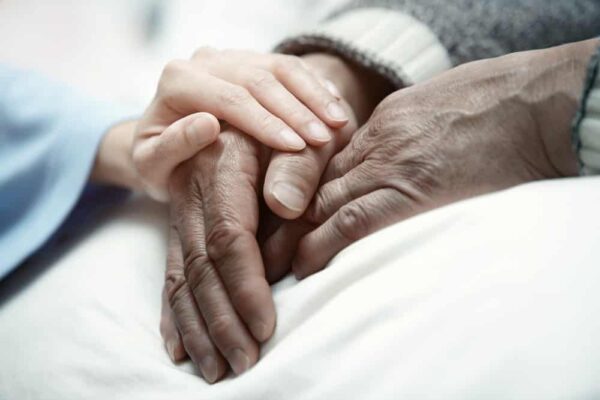It is not easy to watch a loved one experience the physical and mental decline accompanying aging. It is even more difficult to decide when it is time for nursing home care. The decision is different for every person and every family but what it all comes down to is quality of life.
This blog is for educational purposes only and should not be considered legal advice. The use of the Paths Law Firm website does not constitute a client-lawyer relationship.
Signs it is Time for Nursing Home Care
You can define the quality of life based on the quality of health, happiness, and comfort a person enjoys. Quality of life affects both the person in need of care and the caregiver. Suppose the quality of life of either is negatively affected. In that case, it may be time to consider the following factors in deciding whether or not a nursing home is the best solution.
Physical Health Conditions
If a loved one suffers from a medical health condition preventing them from performing basic daily tasks, they need care. When the health condition reaches a stage where at-home care becomes difficult, it may be time to consider care in a nursing home.
A caregiver can look for the following signs when caring for a physical health condition having become unmanageable:
- The need for medical equipment or specialized care and treatments the caregiver is unable to administer.
- Administering medications by the caregiver is no longer possible.
- You have suffered an injury as a result of delivering care. For example, a back injury from lifting a physically challenged loved one.
- Your health is at risk.
- You are physically tired and drained from the effort you are putting into caring for a loved one.
- The health of the person requiring care is at risk by remaining at home.
Whether your loved one will receive better medical care for a physical health condition than you can provide for them at home is the question. It is important to remember your loved one’s physical health will continue to deteriorate as they age, and the illness, disease, or other health condition is going to keep taking its toll on you and your loved one. If you feel caring for your loved one’s physical health needs has become a challenge, it may be time to start looking at nursing home options.

Mental Health Conditions
Dementia, Alzheimer’s Disease, Parkinson’s disease, and cognitive deterioration are mental health conditions most effecting the elderly. While at-home care is possible and recommended mainly in the early stages of these conditions, there comes a time when nursing home care will become necessary.
Mental Health Deterioration of The Care Recipient
Noticing the following signs may be an indication your loved one’s mental health is deteriorating to the extent a nursing home may be better suited to their needs. Some indications:
- Forgetting medication schedule.
- Reporting they are eating, however, there is no sign of meal preparation, and there is spoiled food in the refrigerator.
- Wandering off and increased periods of disorientation and confusion.
- Difficulty managing their hygiene, including bathing, changing clothes, and using the toilet.
- Difficulty remembering or recognizing loved ones and friends.
- Disorientation as to their surroundings.
- Confusion as to date or time.
- Increasing signs of agitation and aggression.
Few caregivers are aware agitation and increased aggression are symptoms of cognitive decline. A formerly placid person can become quite aggressive and even physically assault another person. Aggression from individuals with mental health issues is partially due to cognitive regression and frustration that comes with difficulty recognizing people and their surroundings. It is essential to keep in mind the above signs put your loved one at risk and you and your family.

Mental Health Impacts on the Caregiver
Signs your mental health may be affected by caring for an aging loved one include:
- Chronic fatigue and difficulty focusing and concentrating.
- Irritable and experiencing mood swings.
- Failing to meet your own physical and emotional needs and those of your loved one and other family members.
- Work is suffering.
- Increased anger toward the person you are caring for or other family members.
- Symptoms of anxiety and or depression.
- Decreased interest in social interactions and activities.
- Trouble sleeping.
It is common for caregivers of loved ones to be in denial regarding the cognitive decline they are witnessing in a loved one. This denial, combined with guilt, may prevent the caregiver from seeing their loved one (and the caregiver) may be better off receiving professional nursing care for their mental health disorder in a nursing home environment. It is critical to realize, the state of one’s mental and emotional wellbeing can significantly affect their ability to provide the care a loved one needs.
It is also important to realize a loved one may resist going to a nursing home, especially if they suffer from cognitive decline. We need to remember; cognitive decline means their ability to make decisions is impaired. It is the caregiver’s responsibility to do what is best for them when their mental health deteriorates to the stage where caring at home is no longer the best option.

Accidents and Injuries
As we age, we become less physically capable. Muscles and bone health deteriorate, and combined with physical or mental illness, the risk of accidents, falls, and injuries become more likely. The severity of injuries from an accident or fall in seniors is also greater. For example, a fall is more likely to result in broken bones than usual.
Be aware of the following signs and symptoms that your aged loved one is at greater risk of a fall or accident in the home:
- Difficulty sitting or standing from a sitting position
- Shuffling feet or difficulty walking
- Difficulty grasping or holding objects
- Problems with balance and gross motor coordination
- Hiding accidents and injuries
If your loved one has fallen in the past, they are at a greater risk of falling again. Even if you are around 24 hours a day, there is only so much you can do to prevent a fall or accident from occurring. Nursing home care provides a safer environment for the elderly who are at a greater risk of a fall. The staff understand the increased risk and provide the necessary care to prevent falls and accidents.

Planning Ahead for Nursing Home Care
Sometimes, life throws us a curveball, and a sudden event or illness can leave us in a position where we need to provide care for a loved one. However, in most cases, simple aging is the primary cause of requiring care in later life. If possible, it is vital to plan for when nursing home care may become a necessity.
We should have discussions with parents or other loved ones in advance regarding the need for ongoing care. These discussions may be based on certain life events or stages of physical or mental illness. Decide at which point physical deterioration or cognitive decline will progress far enough for your loved one to require care in a nursing home. Planning will relieve you of the burden of responsibility and guilt you may feel towards caring for your loved one.
Keep in mind there is rarely a specific timeline attached to these decisions. Diseases, illnesses, and aging progress at varying rates and affect people differently. Planning is not about deciding to send a loved one to a nursing home six months, a year, or five years down the line. Instead, it is about determining when the challenge of caring will become significant for both the caregiver and the person in need of care.

In Closing
Visiting nursing homes as early as possible and deciding the best facility for future needs allows the care recipient to choose their future arrangements. It is essential to consider any special needs and personal preferences when choosing a nursing home. Also, ensure the facility is close to family and friends to make visits easier.
You can start planning for nursing home care at any time. However, if a loved one has been diagnosed with a severe illness or a degenerative cognitive disorder, planning should become a priority. It is preferable to make decisions about future care before a disease has progressed or mental health deteriorates to the extent your loved ones can no longer make decisions for themselves.
At Paths Elder Law, we are dedicated to serving seniors and their families through legal representation and support. Our dedicated and caring staff will listen to your unique story and assist you in planning for the future. Whether this includes assistance with planning for nursing home care, estate planning, asset protection, or any other elder care issues you may experience, we are here to help. If you or a loved one need assistance, contact Paths Elder Law to schedule a consultation. Peace of mind is only a phone call away.



































